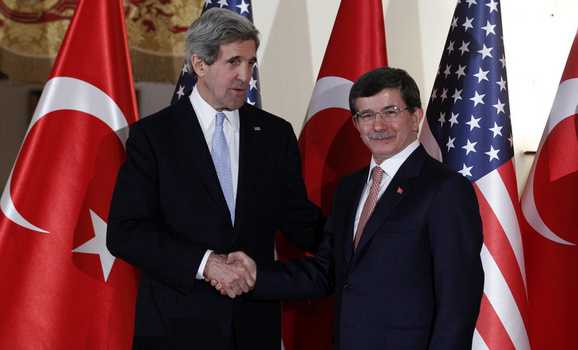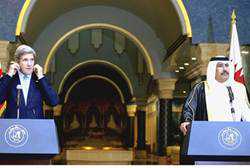IRBIL, Iraq – At an elite private school in Iraq’s autonomous Kurdish region, children learn Turkish and English before Arabic. University students dream of jobs in Europe, not Baghdad. And a local entrepreneur says he doesn’t like doing business elsewhere because the rest of the country is too unstable.
In the decade since U.S.-led forces invaded Iraq, Kurds have trained their sights toward Turkey and the West, at the expense of ties with the still largely dysfunctional rest of the country.
Aided by an oil-fueled economic boom, Kurds have consolidated their autonomy, increased their leverage against the central government in Baghdad and are pursuing an independent foreign policy often at odds with that of Iraq.
Kurdish leaders say they want to remain part of Iraq for now, but increasingly acrimonious disputes with Baghdad over oil and territory might just push them toward separation.
“This is not a holy marriage that has to remain together,” Falah Bakir, the top foreign policy official in the Kurdistan Regional Government, said of the Kurdish region’s link to Iraq.
A direct oil export pipeline to Turkey, which officials here say could be built by next year, would lay the economic base for independence. For now, the Kurds can’t survive without Baghdad; their region is eligible for 17 percent of the national budget of more than $100 billion, overwhelmingly funded by oil exports controlled by the central government.
Since the war, the Kurds mostly benefited from being part of Iraq. At U.S. prodding, majority Shiites made major concessions in the 2005 constitution, recognizing Kurdish autonomy and allowing the Kurds to keep their own security force when other militias were dismantled. Shiites also accepted a Kurd as president of predominantly Arab Iraq.
Still, for younger Kurds, who never experienced direct rule by Baghdad, cutting ties cannot come soon enough.
More than half the region’s 5.3 million people were born after 1991 when a Western-enforced no-fly zone made Kurdish self-rule possible for the first time by shielding the region against Saddam Hussein. In the preceding years, Saddam’s forces had destroyed most Kurdish villages, killing tens of thousands and displacing many more.
Students at Irbil’s private Cihan University say they feel Kurdish, not Iraqi, and that Iraq’s widespread corruption, sectarian violence and political deadlock are holding their region back.
“I want to see an independent Kurdistan, and I don’t want to be part of Iraq,” said Bilend Azad, 20, an architectural engineering student walking with a group of friends along the landscaped campus. “Kurdistan is better than other parts of Iraq. If we stay with them, we will be bad like them and we won’t be free.”
Kurds are among the main beneficiaries of the March 20, 2003 U.S.-led invasion that ousted Saddam, and sympathy for America still runs strong here.
Rebaz Zedbagi, a partner in the Senk Group, a road construction and real estate investment company with an annual turnover of $100 million, said his own success would have been unthinkable without the war.
The 28-year-old said he won’t do business in the rest of Iraq, citing bureaucracy and frequent attacks by insurgents, but said opportunities in the relatively stable Kurdish region are boundless.
“I believe Kurdistan is like a baby tiger,” said Zedbagi, sipping a latte in a Western-style espresso bar in the Family Mall, Irbil’s largest shopping center. “I believe it will be very powerful in the Middle East.”
The Kurdish region has undergone a dramatic transformation in the past decade.
Its capital, Irbil, once had the ambiance of a large village. It has grown into a city of 1.3 million people, with the beginnings of a skyline, several five-star hotels and construction cranes dotting the horizon.
The SUV-driving elites have moved into townhouses in new gated communities with grand names like “The English Village.” Irbil’s shiny glass-and-steel airport puts Baghdad’s to shame.
The number of cars registered in the province of Irbil — one of three in the Kurdish region — jumped from 4,000 in 2003 to half a million today and the number of hotels from a handful to 234, said provincial governor Nawzad Mawlood.
Planning Minister Ali Sindi took pride in a sharp drop in illiteracy, poverty and unemployment in recent years.
But the Kurds have a lot more work cut out for them. The region needs to spend more than $30 billion on highways, schools and other basic infrastructure in the next decade, Sindi said. A housing shortage and a high annual population growth rate of almost 4 percent have created demand for 70,000 new apartments a year.
There’s also a strong undercurrent of discontent, amid concerns about the concentration of power in the hands of a few. Opposition activists complain of official corruption, and the international group Human Rights Watch said security forces arbitrarily detained 50 journalists, activists and opposition figures in 2012.
The region’s parliament “is weak and cannot effectively question the (Kurdish) government,” said Abdullah Mala-Nouri of the opposition Gorran party.
Iraq’s central government strongly opposes the Kurds’ quest for full-blown independence.
Iraqi leaders bristle at Kurdish efforts to forge an independent foreign policy, and the two sides disagree over control of disputed areas along their shared internal border. In November, Kurdish fighters and the Iraqi army were engaged in a military standoff, and tensions remain high.
Oil is at the root of those disputes.
Iraq sits atop the world’s fourth largest reserves of conventional crude, or about 143 billion barrels, and oil revenues make up 95 percent of the state budget. Kurdish officials claim their region holds 45 billion barrels, though that figure cannot be confirmed independently.
The central government claims sole decision-making rights over oil and demands that all exports go through state-run pipelines. The Kurds say they have the right to develop their own energy policy and accuse the government of stalling on negotiating a new deal on sharing oil revenues.
The Kurds have also passed their own energy law and signed more than 50 deals with foreign oil companies, offering more generous terms than Baghdad.
An oil company doing business in the region, Genel Energy, began shipping Kurdish oil by truck to Turkey in January.
The planned direct export pipeline is of strategic importance, said Ali Balo, a senior Kurdish oil official. “Why are we building it? Because we always have problems with Baghdad.”
The project also highlights Turkey’s growing involvement in the region, a marked change from just a few years ago when ties were strained over Ankara’s battle against Kurdish insurgents seeking self-rule in Turkey.
Mutual need forged the new relationship.
Turkey, part of the region’s Sunni Muslim camp, needs more oil to fuel its expanding economy. It prefers to buy from the Kurds rather than the Shiite-led government in Baghdad, seen as a member of the region’s rival Iranian-influenced axis. The Kurds, also predominantly Sunni, need Turkey not just as a gateway for oil exports but also as a business partner.
Almost half of nearly 1,900 foreign companies operating here are Turkish, government officials say. Seventy percent of Turkey’s annual $15 billion Iraq trade is with the Kurdish region.
In a sign of the times, Turkish and English are the languages of instruction at a top private school in Irbil. During music class at the Bilkent school, third-graders sitting cross-legged on a large carpet sang “Twinkle, twinkle, little star” in Turkish, followed by “London Bridge” in English.
The 351 students start studying Kurdish, the native language of most, in third grade. Arabic is introduced last, in fourth grade.
The curriculum reflects the priorities of the school’s founder, a member of Iraq’s ethnic Turkmen minority. But it also suits Kurdish parents who believe their children’s future is tied to Turkey.
Oddly, Turkish-Kurdish ties are flourishing at a time of continued cross-border violence.
Turkish warplanes routinely strike bases of the Kurdistan Workers’ Party, or PKK, a Turkish rebel group operating from the Qandil mountains of Iraq’s Kurdish region. The PKK launches raids into Turkey from its mountain hideouts.
Both sides are simply keeping the two issues separate.
Turkey has stopped linking improved ties with Irbil to resolving Turkey’s conflict with the PKK, a fight which has claimed thousands of lives since 1984. The Kurds keep quiet about Turkish airstrikes on their territory.
As problems with Baghdad fester, Kurdish officials say their region’s departure from Iraq is inevitable. Many here dream of an independent Kurdistan, made up of parts of Syria, Turkey, Iran and Iraq, home to more than 25 million Kurds.
“As a people, we deserve that,” said Bakir, the foreign policy official. “We want to see that in our lifetime.”
But with key allies such as the U.S. and Turkey opposed to splitting up Iraq, the Kurds say they won’t act with haste or force.
Asked if the Kurdish region would declare independence once it can export oil directly, Bakir said: “We will cross that bridge when we get there. At this time, we are still committed to a democratic, federal, pluralistic Iraq.”
Read more: http://www.foxnews.com/world/2013/03/10/decade-after-us-led-invasion-kurds-look-to-turkey-west-mull-future-without-iraq/#ixzz2NDU9esgq




